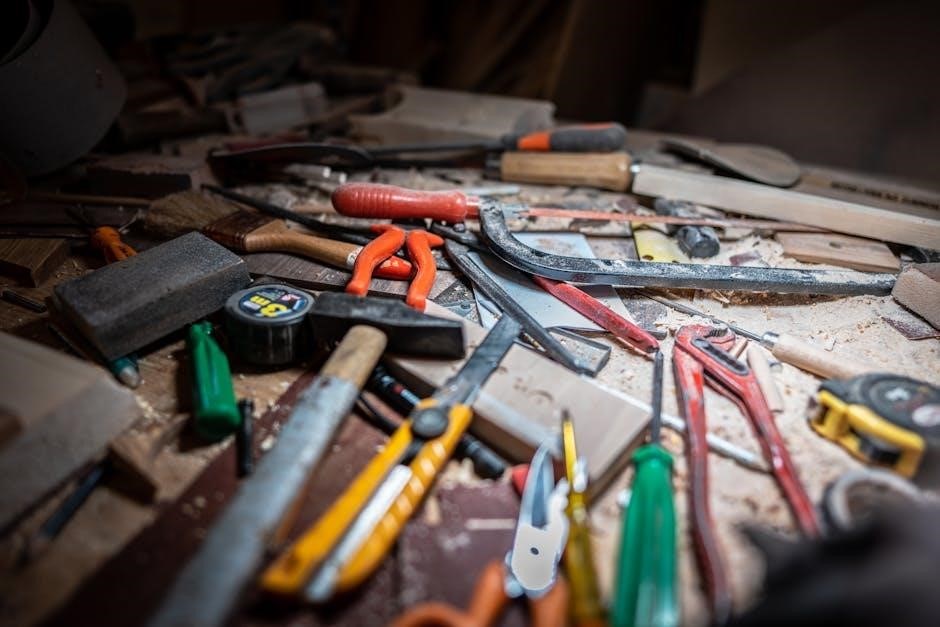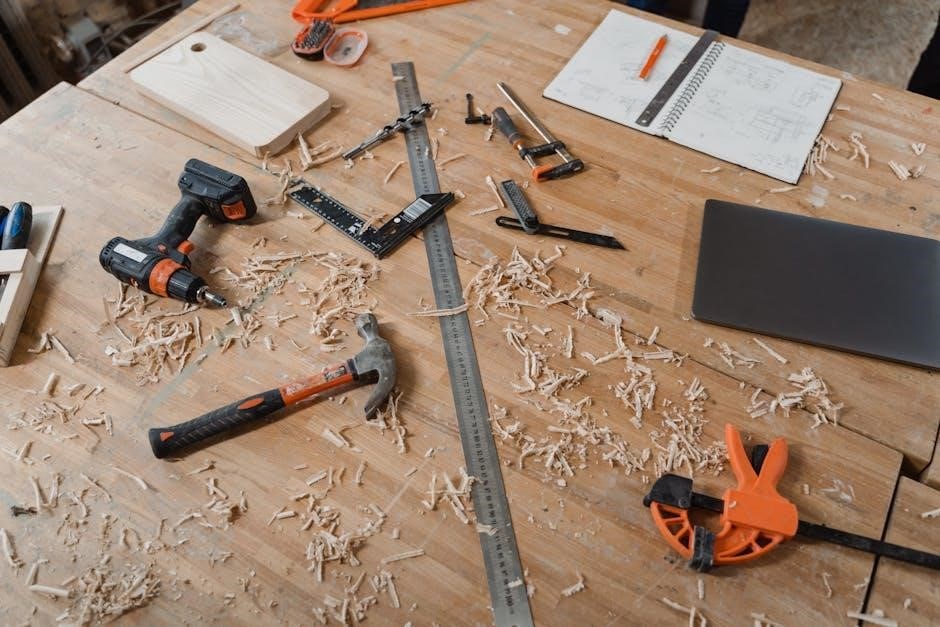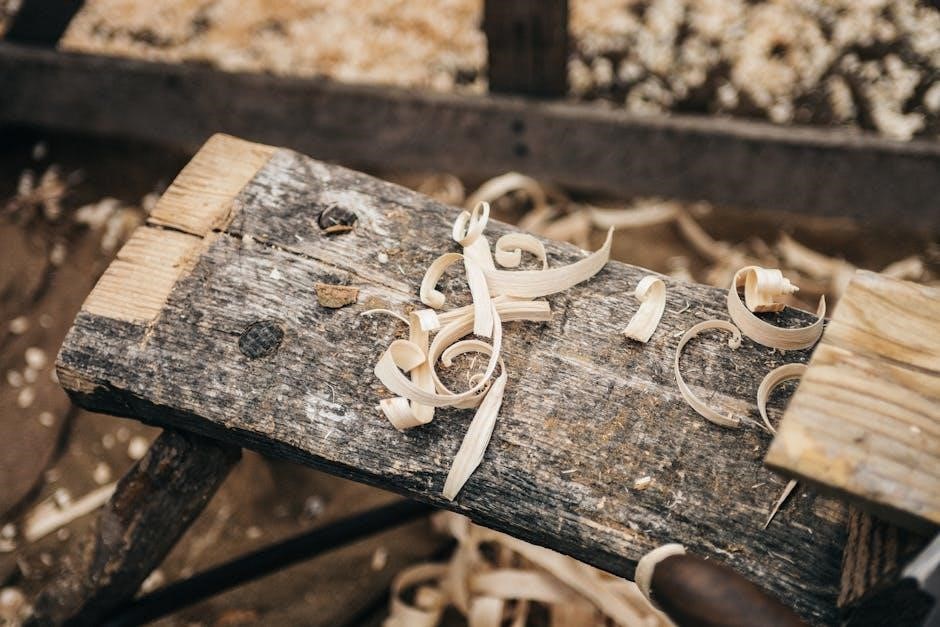
clamp and saw guide
Clamps and saws are fundamental tools in woodworking‚ enabling precise cutting and secure material handling. Their versatility and efficiency make them indispensable for both professionals and hobbyists.
1.1 Importance of Clamps and Saws in Woodworking
Clamps and saws are essential for woodworking‚ ensuring precise cuts and secure material handling. Clamps hold materials firmly‚ preventing movement during cutting‚ while saws enable accurate and clean cuts. Together‚ they enhance safety‚ efficiency‚ and the quality of woodworking projects‚ making them indispensable tools for both professionals and hobbyists.
1.2 Brief History and Evolution of Clamping and Cutting Tools
Clamping and cutting tools have evolved significantly since ancient times‚ with early clamps made from wood and saws crafted from bronze. The Middle Ages introduced metal clamps‚ while the Industrial Revolution brought mechanized saws. Modern tools feature advanced materials and mechanisms‚ enhancing efficiency and precision‚ as seen in today’s versatile clamps and high-tech saws.

Types of Clamps
Clamps vary in design‚ including spring clamps for temporary holds‚ C-clamps for heavy-duty tasks‚ and panel clamps for delicate surfaces‚ each serving specific woodworking needs.
2.1 Spring Clamps
Spring clamps are ideal for temporary holds and light-duty projects. They offer quick and easy clamping with minimal effort‚ making them perfect for small woodworking tasks and hobbies. Their compact design ensures they don’t take up too much space‚ while still providing reliable grip strength for various materials‚ enhancing workflow efficiency in workshops and DIY settings alike.
2.2 C-Clamps
C-Clamps are versatile and durable tools‚ widely used in woodworking for their strong gripping power. Featuring a C-shaped frame‚ they offer excellent adjustability and can handle various materials‚ including wood and metal. Their robust construction makes them suitable for heavy-duty projects‚ ensuring stability and control during tasks that require precise clamping‚ making them a staple in many workshops and professional settings.
2.3 Panel Clamps
Panel clamps are specialized tools designed for holding large‚ flat materials like panels or boards securely in place. They feature a wide clamping surface and are ideal for tasks requiring even pressure distribution. Their ease of use and versatility make them essential for woodworking projects‚ ensuring stability and precision when working with delicate or oversized materials‚ enhancing overall workshop efficiency.

Types of Saws
Saws are essential tools for cutting materials‚ with options like circular saws for straight cuts‚ jigsaws for curves‚ and track saws for precise‚ guided cuts.
3.1 Circular Saws
Circular saws are powerful tools for making straight cuts in various materials. They feature rotating blades with sharp teeth‚ ideal for cutting wood‚ metal‚ and plastic. Portable and versatile‚ they are commonly used in woodworking for ripping boards or cross-cutting. With proper guides‚ they achieve precise results‚ making them a must-have for any workshop.
3.2 Jigsaws
Jigsaws are versatile tools ideal for curved and irregular cuts in wood‚ plastic‚ and metal. Their reciprocating blades allow precise control‚ making them excellent for detailed work. Lightweight and portable‚ jigsaws are perfect for tight spaces and intricate designs. They excel at cutting thin materials and are a must-have for projects requiring curved or non-linear cuts with high accuracy and ease of use.
3.4 Track Saws
Track saws are ideal for making precise‚ straight cuts in large panels and boards. They use a guide rail to ensure accuracy and minimize waste. Perfect for woodworking‚ these saws excel at breaking down sheet goods and creating clean edges. Their portability and dust-collection capabilities make them a favorite for professionals and DIYers alike‚ ensuring efficient and precise cutting every time.

Materials and Tools Needed for Clamping and Cutting
Essential materials include wood‚ metal‚ and plastic for projects. Tools like clamps‚ saws‚ sandpaper‚ and safety gear are crucial for precise cutting and secure clamping‚ ensuring safety and quality.
4.1 Essential Materials for Woodworking Projects
Wood‚ glue‚ fasteners‚ sandpaper‚ and finishes are core materials. Proper selection ensures durability and aesthetics. Additional items like clamps and saws enhance precision and safety‚ making them vital for successful woodworking.
4.2 Additional Tools for Precision and Safety
Measuring tapes‚ squares‚ and marking tools ensure accuracy. Safety glasses‚ push sticks‚ and dust masks protect during sawing. Workbenches and vices provide stable work surfaces‚ enhancing control and preventing accidents while clamping and cutting. These tools are essential for maintaining precision and safety in woodworking projects.

Safety Guidelines and Best Practices
Ensuring proper tool usage‚ wearing protective gear‚ and maintaining a clean workspace are crucial for safe and efficient woodworking. Adhering to these guidelines prevents accidents.
5.1 Safety Precautions When Using Clamps
Always wear protective gloves and eyewear when using clamps to avoid injury. Ensure clamps are securely tightened to prevent shifting during woodworking. Avoid over-tightening‚ which can damage materials or tools. Regularly inspect clamps for wear or damage and replace them if necessary. Keep the workspace clean and clear to avoid accidents. Proper clamp maintenance ensures reliability and safety.
5.2 Safety Tips for Operating Saws
Always wear safety glasses and a dust mask when operating saws. Keep loose clothing tied back and avoid jewelry that could catch. Use a push stick or other safety tools to maintain control. Ensure the saw blade is sharp and appropriate for the material. Keep the workpiece flat and stable. Never reach over a moving blade‚ and follow the manufacturer’s guidelines for operation.
Choosing the Right Clamp and Saw for Your Project
Selecting the correct clamp and saw depends on the material type‚ thickness‚ and desired precision. Consider the project’s size and required durability to ensure optimal tool performance.
6.1 Factors to Consider When Selecting Clamps
When selecting clamps‚ consider the material type‚ thickness‚ and required clamping force. The size‚ weight‚ and quality of the clamp are crucial. Additionally‚ cost and durability should be evaluated to ensure the clamp meets your project’s needs effectively. Proper fit and ease of use are also important for ensuring safety and precision in woodworking tasks.
6.2 How to Pick the Right Saw for Your Task
Choose a saw based on the material you’re cutting‚ such as wood‚ metal‚ or plastic. Consider the desired cut type—straight‚ curved‚ or ripping. Circular saws are ideal for straight cuts‚ while jigsaws excel at curved lines. Track saws offer precision for wide boards. Assess blade type‚ power source‚ and ergonomic design to ensure efficiency and safety for your specific task.
Step-by-Step Guide to Using Clamps and Saws
Mastering clamps and saws involves proper setup‚ alignment‚ and execution. Secure materials firmly with clamps‚ ensuring stability. Use saws with precise‚ controlled motions‚ maintaining safety throughout the process.
7.1 Proper Techniques for Clamping Materials
Proper clamping involves ensuring materials are aligned and held firmly without over-tightening; Use appropriate clamp types for the project‚ such as spring clamps for temporary holds or C-clamps for heavy-duty tasks. Always protect surfaces with padding to prevent damage. Position clamps evenly to maintain balance and avoid warping the material during the clamping process.
7.2 Effective Sawing Methods for Different Materials
Effective sawing requires matching the saw type to the material. Circular saws excel with straight cuts in wood‚ while jigsaws handle curved lines. For precise cuts in large panels‚ track saws are ideal. Always maintain consistent blade speed and apply steady pressure‚ ensuring the material is securely clamped to prevent movement during the cutting process.
Troubleshooting Common Issues
Troubleshooting common issues with clamps and saws involves identifying misalignment‚ uneven pressure‚ or blade dullness. Regular maintenance and proper technique often resolve these problems effectively quickly.
8.1 Solving Clamping-Related Problems
Clamping issues often arise from improper alignment or uneven pressure. Using high-quality‚ adjustable clamps ensures a secure hold. Regularly inspect and maintain clamps to prevent wear. Avoid over-tightening‚ as it may damage materials. For slippery surfaces‚ add non-slip pads. Ensure the clamp fits the material size and type‚ and always follow manufacturer guidelines for optimal performance and safety.
8.2 Addressing Saw-Related Challenges
Common saw issues include dull blades‚ uneven cuts‚ and material kickback. Regularly sharpen or replace blades for optimal performance. Use guides or fences for straight cuts and maintain proper stance. Ensure materials are securely clamped to prevent movement. Address binding by checking blade alignment and adjusting as needed. Always follow safety protocols and tool maintenance guidelines for reliable results.
Clamps and saws are essential in woodworking‚ offering precision and efficiency. Their evolution reflects advancing technology. Always prioritize safety and proper techniques to achieve professional results.
9.1 Summary of Key Points
Clamps and saws are essential woodworking tools‚ ensuring precision and efficiency. From spring clamps to circular saws‚ their evolution reflects advancing technology. Safety‚ proper techniques‚ and selecting the right tools for the task are crucial. Understanding materials‚ maintaining equipment‚ and following best practices lead to successful projects. Mastery comes with practice and patience.
9.2 Advanced Tips for Mastering Clamping and Sawing
For advanced techniques‚ combine clamps strategically for complex projects and maintain tools sharp. Experiment with precision jigs for consistent cuts and customize setups for specific materials. Regularly inspect and adjust clamps and saws for optimal performance. Practice ergonomic handling to reduce fatigue and always prioritize safety with protective gear and proper tool maintenance;
Related posts:
Archives
- February 2026
- January 2026
- December 2025
- November 2025
- October 2025
- September 2025
- August 2025
- July 2025
- June 2025
- May 2025
- April 2025
- March 2025
- February 2025
- January 2025
- December 2024
- November 2024
- October 2024
- September 2024
- August 2024
- July 2024
- June 2024
- May 2024
- April 2024
- March 2024
- February 2024
- January 2024
- December 2023
- November 2023
- October 2023
- September 2023
- August 2023
- July 2023
- June 2023
- May 2023
Calendar
| M | T | W | T | F | S | S |
|---|---|---|---|---|---|---|
| 1 | ||||||
| 2 | 3 | 4 | 5 | 6 | 7 | 8 |
| 9 | 10 | 11 | 12 | 13 | 14 | 15 |
| 16 | 17 | 18 | 19 | 20 | 21 | 22 |
| 23 | 24 | 25 | 26 | 27 | 28 | 29 |
| 30 | 31 | |||||
Leave a Reply
You must be logged in to post a comment.